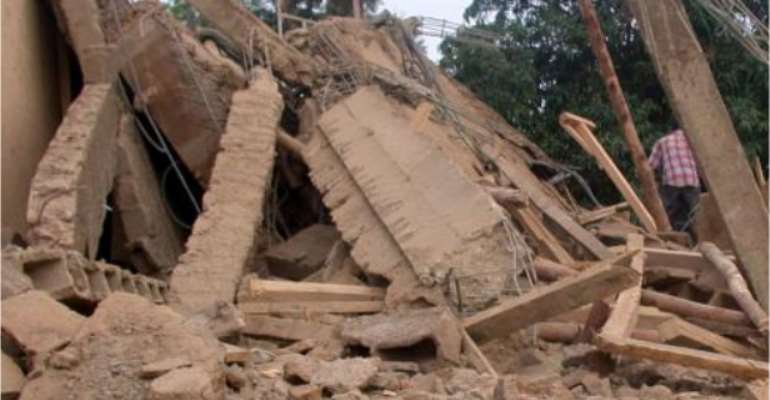Lekki Building Tragedy As Wake Up Call

The sacking of four officials of the Lagos State Building Control Agency by Governor Akinwunmi Ambode, a fallout of the Lekki building collapse that claimed the lives of over 30 people, should be one of the many ways to react to the tragedy that shook the country to its foundation. The big stick wielded by the governor is indicative of the fact that there was, indeed, official negligence by those whose job it was to prevent that tragedy from occurring.
But now that the four officials have paid for their negligence with their jobs, what form of compensation is going to come to those who paid for that same negligence with their lives? While material compensation may suffice for those who sustained varying degrees of injuries in the unfortunate incidence, no form of compensation can equate the lives that have been lost, even if the case currently in a Lagos magistrate’s court ends with compensation to families of those that died in the tragedy. But did we have to allow this happen?
The tragedy of the Lekki building collapse, regrettably one of the many in recent times, must be looked at within the wider context of the acute shortage of social infrastructure in the country, like housing, electricity, water and healthcare. Nigeria, a country of more than 170 million people, is said to be confronted with a huge housing deficit of something in the region of 20 million.
Government’s inability to close the yawning gap between demand for housing and what is available naturally spurred private sector involvement in the industry. This, evidently, is what has made the significant difference, especially in the last five years or so.
Lekki Worldwide Estates Limited, promoters of Lekki Gardens, is one of the real estate developers that responded to the outcry for provision of housing to meet the country’s rapidly increasing population. The company, which commenced business in January, 2012, has built and managed 57 estates in three states of the federation and the federal capital territory, delivering close to 3,000 high quality housing units to Nigerians in the middle and upper classes at affordable costs.
Beyond housing delivery, the company is said to provide direct and indirect employment to about 10,000 Nigerians. This, it is able to do, because it does not just build and deliver houses, but also has in place support staff that are engaged in the management of the estates at all stages.
The March 8 tragedy on one of the many buildings it is currently constructing – the first time in its existence in all its estates – is certainly a stain on its otherwise unblemished record. The company deserves sympathy, if it is considered that this is an unfortunate first in its history, though it can be acknowledged that the loss of 35 lives eroded whatever sympathy it might deserve.
The apparent negligence by supervisory authorities in Lagos, as we have seen from the sack of some officials, may be one of the areas where something went wrong with the construction of the single structure that has reversed the gains Lekki Gardens made in the concerted effort to provide quality housing to Nigerians.
It is an understatement to say that Nigeria has become a haven and dumping ground for fake and sub-standard products. The situation is not helped by failure on the part of regulatory agencies to perform their statutory functions.
Some of the incidences of building collapse in the country have been attributed to the use of sub-standard and fake building materials that were expected to have passed through routine check by an agency like the Standards Organization of Nigeria (SON). Negligence by the SON is the reason sub-standard materials end up being used in the construction of buildings that either collapse during construction or do not stand the test of time. It is the same reason our markets are flooded by sub-standard electricity cables that result in fire disasters in houses where they are used, with attendant tragedies.
The same level of negligence is also found in other areas. Prohibited foreign goods find their way into the markets because officials of the Nigerian Customs look the other way while such goods are taken through our boarders.
The Lekki building tragedy must be seen as the wake-up call that it is, though a very painful one. It is one building collapse too many, and should signify the beginning of a new era when government agencies take their responsibilities seriously, especially when it has to do with public safety. The sacking of officials of the Lagos State Building Control Agency is perhaps the first time a government has reacted with such swiftness in identifying a problem where it exists and taken steps to solve the problem from the root.
If it is true that the owners of Lekki Gardens ignored advice not to go above three stories on the building that has brought tragic consequences, then building of the structure up to five stories where it collapsed must have been done with somebody’s supervision. But beyond negligence on the part of those that were expected to supervise building of the structure, investigations should also include materials that were used, with a view to identifying the agencies that approved their use and meting out appropriate punishment to those involved.
It is the only way government agencies can be made to be alive to their responsibilities, if a noble idea like provision of a basic necessity like housing is not to remain a constant source of national grief
